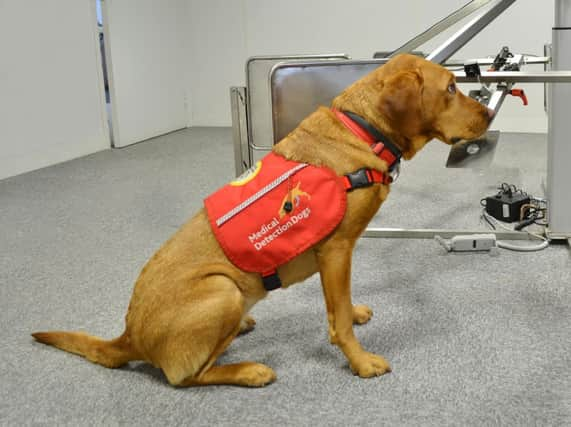Dogs shown to sniff out prostate cancer


The Italian study backs up tests carried out by the charity Medical Detection Dogs, which is based in Buckinghamshire.
Its co-founder, Dr Claire Guest, said its research had found a 93 per cent reliability rate when detecting bladder and prostate cancer, describing the new findings as “spectacular”.
Advertisement
Hide AdAdvertisement
Hide AdThe latest research, by the department of urology at the Humanitas Clinical and Research Centre in Milan, involved two German shepherds sniffing the urine of 900 men – 360 with prostate cancer and 540 without.
Scientists found one dog got it right in 98.7 per cent of cases, while the other’s success rate was 97.6 per cent.
They said the dogs were able to detect prostate cancer-specific volatile organic compounds in the urine but it remained to be seen of how a dog would find them in daily practice.
Prostate cancer is the most common cancer in men in the UK, with more than 40,000 cases diagnosed every year. One in 11 Scots men have the disease, but treatment is improving survival rates, particularly with early detection.
Dr Guest said: “These results are spectacular. They offer us further proof that dogs have the ability to detect human cancer.
“It is particularly exciting that we have such a high success rate in the detection of prostate cancer, for which the existing tests are woefully inadequate.”
She said there was a “reluctance to embrace this tested, time-old technology” but pointed out that dogs can pick up a scent in a dilution of one part in a thousand.
There is no single test for prostate cancer, but the most commonly used are blood tests, a physical examination or a biopsy.
Advertisement
Hide AdAdvertisement
Hide Ad“Over the years, millions of pounds of NHS funding has been poured into the traditional test methods, and yet there has been little improvement in their reliability,” Dr Guest said.
“This has caused a huge waste of resources, not to mention the distress to the impacted individuals.
“Moreover, the detection dogs provide an alternative solution that yields consistently accurate results. If our detection dogs were a machine, there would be huge demand for them.”
Medical Detection Dogs, which is based in Milton Keynes, trains specialist canines to detect the odour of human disease.
Previous research has found that dogs can detect lung and breast cancer from a patient’s breath, ovarian cancer from smelling blood, melanoma from the smell of skin, and colorectal cancer from stool samples.
Fruit flies have also been found to be able to detect cancer cells, while the giant African pouched rat can detect tuberculosis, according to studies.